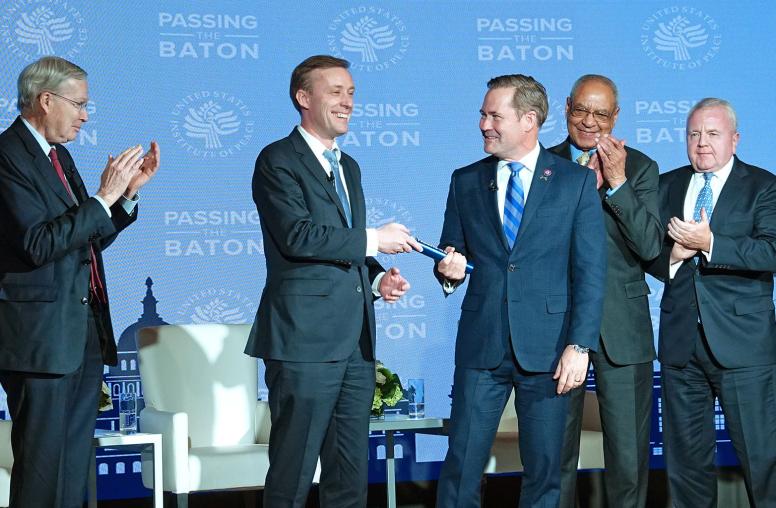Macedonia: Not Out of the Woods Yet, U.S. Support Still Needed
Newsbyte looks at challenges ahead for Macedonia
WASHINGTON--Macedonia won its independence constitutionally and without violence in 1991 and was often praised by outsiders in the succeeding decade for the way it handled human rights, but recent years have posed enormous challenges. Charges of discrimination against Albanians and inequitable representation in the public administration and public sector companies have roiled ethnic relations. Disruption of trade because of sanctions against Yugoslavia and the Greek embargo against Macedonia, the sheltering of Kosovo refugees, the use of Macedonia as a logistical base for operations in Kosovo, and the spillover of violence from Kosovo have strained the Macedonian state. Its political leadership deserves more credit than it has gotten for reaching the peace agreement at Ohrid in August 2001 and for trying to return to a culture of tolerance.
The Balkans Working Group met on October 18, 2002 to discuss the prospects for a new governing coalition in Macedonia, implementation of the Ohrid agreement, the EU's political and economic leadership, the future of the NATO military mission and the role of the United States. The discussion was off the record and not for attribution, but this Newsbyte summarizes the main points of discussion.
The September elections open a new chapter…
While the September 15 parliamentary elections in Macedonia were not perfect, international and local observers confirm that they were significantly more orderly and less rife with fraud than in the past. The strong showing of both the Social Democrats led by Branko Crvenkovski and a new Albanian party led by former guerilla leader Ali Ahmeti opens up new opportunities, especially as both parties support the Ohrid Framework Agreement and want to move forward. While some ethnic Macedonians do not welcome it, the presence of the former Albanian guerillas in Parliament is a factor for stability.
…but there is a risk of politics as usual
Both parties in the new governing coalition promised protection to their respective ethnic groups, and early moves to divide up not only ministerial posts but also jobs in state-owned companies suggest that there may be no fundamental change in the way politics are conducted in Macedonia. If they are to attract foreign investment, the new leaders need to move quickly not only to re-establish security but also to support interethnic reconciliation, turn anti-corruption rhetoric into reality and establish the rule of law. Reform of the judiciary, customs, police, and tax authorities is crucial. Deep structural change is needed. This will require not only courage and imagination by the new government but also a vigorous political opposition and independent civil society organizations.
EU leadership on the political and economic fronts has worked…
The EU approach to Macedonia is two-pronged. On the political side, the Common Foreign and Security Policy was effective in helping to bring about the Ohrid agreement and its implementation, which includes not only constitutional changes but also many new or amended laws. On the economic side, asymmetrical trade liberalization has begun to provide opportunities for Macedonia to export to the EU. Macedonia's administrative capacity is, however, limited, partly due to low-paid and poorly trained civil servants, and the country has not done all it should to fulfill its obligations. Carrot and stick may both need to be applied. EU assistance properly targets in part Albanians, who need to see their rights under the Ohrid agreement safeguarded.
Macedonia's hope of becoming a candidate for EU membership are too far in the future to act as an effective incentive. An earlier harvest of incentives and assistance may be required, beyond that already offered in the Stabilization and Association Process.
…but how to meet the future security challenge is still unclear
Macedonia has been an importer of security. Its goal should be to export security. European troops, put in place under NATO command to protect EU and OSCE monitors, had in fact a much broader significance. They were critical to stabilizing the situation in Macedonia, which had suffered a major internal security breakdown.
The nature of the security challenge has changed. The main security problems are internal, not cross-border insurgency. The current configuration of security forces is not the correct response. The EU and NATO need to look for ways to avoid a new international protectorate when the NATO mandate expires on December 15. A NATO monitoring mission to include both civilian and military personnel may be appropriate.
The Macedonian army should have two objectives: to be capable of meeting a guerrilla challenge along its borders and to prepare itself for NATO membership. The existing force has antiquated and inappropriate equipment and is inadequately trained for its main mission. Major changes are required to create a lighter and more mobile force that could suppress the kind of insurgency that arose in 2001. Also needed is integration of Albanians into the Army (especially the senior ranks) and an end to paramilitary forces. U.S. and UK assistance, as well as a major effort on the part of the Macedonian Army and defense ministry over the next ten years, will make it possible for Macedonia to contribute seriously to regional security institutions and eventually to NATO.
The United States should continue to play a supporting role
The U.S. plays a supporting role to the EU in Macedonia, both through NATO and bilaterally. This has proved adequate during the past year, but it is important to maintain close U.S.-EU coordination and to ensure that any shift in the NATO mission is not misinterpreted as U.S. withdrawal. If Macedonia were to collapse, an entire decade of Western effort in the Balkans would be lost. A comprehensive and long-term commitment is required, one to which the U.S. should continue to contribute.
The views summarized here reflect the discussion at the meeting; they do not represent formal positions taken by the Institute, which does not advocate specific policies.



